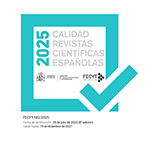Archeology and nationalism: The development of archeology in Catalonia (1907-1936)
Abstract
After the Congress of Vienna in 1815, the European states began to use archaological research as a way to legitimize their political aspirations. In Catalonia, towards the end of the nineteenth century, the cultural movements of the Renaixença and Noucentisme called for a renaissance of Catalan culture that would underscore its distinctive nature visà- vis the Spanish state. This proposal was quickly followed by political demands for self-government and recognition of the Catalan language and its areas of influence. For instance, Enric Prat de la Riba, one of the main activists and ideologists of Catalan nationalism, used the results of the excavations of Empúries as the basis of his politics of difference. This paper explores the influence of nationalism on the organization of Catalan archaology through an analysis of the political discourses of the leaders of the Regionalist League of Catalonia (Lliga Regionalista de Catalunya) and the archives of the History and Archaology Section of the Institute of Catalan Studies (Institut d’Estudis Catalans).Downloads
##submission.format##
Licenza
La revista Complutum, para fomentar el intercambio global del conocimiento, facilita el acceso sin restricciones a sus contenidos desde el momento de su publicación en la presente edición electrónica, y por eso es una revista de acceso abierto. Los originales publicados en esta revista son propiedad de la Universidad Complutense de Madrid y es obligatorio citar su procedencia en cualquier reproducción total o parcial. Todos los contenidos se distribuyen bajo una licencia de uso y distribución Creative Commons Reconocimiento 4.0 (CC BY 4.0). Esta circunstancia ha de hacerse constar expresamente de esta forma cuando sea necesario. Puede consultar la versión informativa y el texto legal de la licencia.










